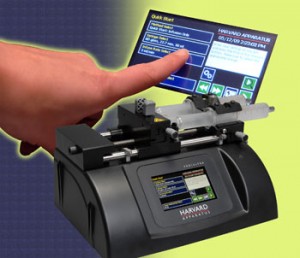
Ready for more regenerative medicine? We visited with the technical staff at the Harvard Apparatus Regenerative Technology group of Harvard Bioscience. Harvard Bioscience is a Holliston, MA based company that provides technology used throughout the field of regenerative medicine. The current management took the company from a $10 M to $110 M in the last 15 years, that’s more than a tenfold increase. As important as their net worth is, that isn’t what’s most important at this company. Harvard Bioscience strives to make the best possible equipment for the scientists who use their technology and reduce their research time.
Harvard Apparatus has two major technologies that are advancing science right now. The first is a clinical infusion syringe pump targeting the safety and accuracy of delivering medicine to patients in hospitals. When liquids need to be delivered at a constant and precise volume per unit of time, especially when the volumes are low, injection by hand is ineffective. Harvard Apparatus is the world leader in high precision research syringe pumps allowing doses as low as microliters per minute over an extended period of time at a programmable rate. This is combined with technology to maintain cells allowing precise delivery in cellular therapy applications such as injecting stem cells.
They also are optimizing an ex vivo isolated organ perfusion system. This system allows organs to be maintained outside the body and the effects of new drugs and treatments tested on actual organs.
These technologies may not suggest regenerative medicine from first glance, so how did they get started with regenerative medicine? President David Green identified regenerative medicine as a possible new field to enter based on the technologies already being pioneered by the company. The Ex Vivo Profusion System as they knew it was a Bioreactor to some of their customers. The ability to keep organs alive outside of the body enabled the decellularization of organs—taking all of the donor cells out to enable stem cells from the patient to grow within the scaffolding of the organ and become a new organ. Combining collaboration with leading scientists and additional R&D on their Bioreactors, the company identified and are implementing what scientists and researchers need to advance research.
Want to know more about the bioreactors and what else Harvard Apparatus has to offer? Come check out our next few posts on their technology and how it’s being applied today. What do you think about bioreactors and their syringe pump? Let us know @TRA360!
